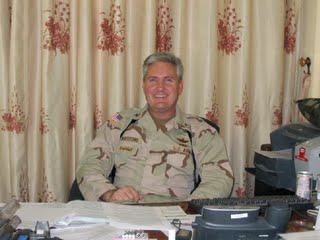I have this love-hate relationship with my Blackberry. I am old enough to remember the pleasure in receiving and reading letters (remember those?), especially when I was overseas. The Blackberry is a cascade of these little pleasures, instantly available on my hip. The content of the messages are irrelevant. What is important is that they were sent to ME.On the other hand, every time I hear my Blackberry buzzing at an odd hour, I am reminded of the reason that the State of Florida has issued me this device: to contact me in case of a disaster. And at those odd hours, as I am pulling my Blackberry from it's case to read the message, I wonder if this will be the message that changes my life: the summons to the state emergency operations center (EOC) to respond to the Big One. I have been summoned in some way similar many times before. In 1998, before anyone even heard of Blackberries, I was driving my daughter to school in the morning when I heard on NPR that 5 tornadoes had struck central Florida in the early morning, with widespread damage and casualties. I made a mental note to head over to the state EOC after dropping off my daughter to see what was up. Seconds later, I felt the vibration of the pager on my belt. Because I was driving I handed the pager to my daughter and asked her to read aloud the text message. "Report to the EOC," she read aloud.On the morning of January 13, 2010 I received an email with the same instructions. I had heard about the Haitian earthquake the night before but didn't expect to be involved because it was in another country. I was wrong. I had not really read the state's Repatriation plan.
Over the next three weeks I was to learn a lot about Repatriation, and the way the federal government functions and doesn't function during a disaster. But most of all, I was to be reminded (once again!) that Florida has the best state emergency operations team in the country.
Repatriation is the return of U.S. citizens from overseas after a disaster. The Department of State is responsible for orchestrating this movement. State tasks the federal Department of Health & Human Services (HHS) to take care of these citizens as they arrive, possibly with nothing more than the clothes on their back. Within HHS the Office of Refugee Resettlement (ORR) signs an agreement with a state agency designated by the Governor to perform the Repatriation services. In Florida, the Governor designated the Department of Children & Families (DCF).
According to the state Repatriation plan, which is based on the draft November 2008 Office of Refugee Resettlement Plan (ORR), DCF would meet the returning U.S. citizens at the designated airport in Florida and assist these citizens in moving onward to their homes, primarily by lending them money for airfare, hotel rooms and food. The recipient of the money would sign an agreement promising to pay the federal government back, receive their support, and then move on their way home. The federal plan also says that federal ORR will reimburse state DCF and all other state and local agencies for any expenses related to this federal operation.
Who pays, as in so many other things in life, is an extremely important part of the plan.
Unfortunately, when I arrived at the state emergency operations center the morning of Wednesday, January 13 I was not familiar with either the federal plan or the state plan. Not very many other people at the state EOC were familiar with the plans either. I went from meeting to meeting, as we all tried to get organized to support this federal mission, leafing through the plans while trying to listen to people telling me new information. Nobody in any of these meetings had ever done this before.
That afternoon we crammed into a room at the state EOC to listen to a conference call with the Office of Refugee Resettlement (ORR) and two other states. ORR told us that there would be no Repatriation from Haiti, and if there was, then they would take care of it. This was the first of several times that we received misinformation from ORR.
Fortunately for all concerned, we didn't believe her. We were watching the news along with everyone else, and we knew that the people on the island were in serious trouble and would be desperate to get out and return to the United States. The state EOC remained at a partial activation, and we returned there the next day with the expectation that something was going to happen,
And at 5 PM Thursday afternoon, January 14, something did happen, We received a phone call from ORR (the same person who assured us the previous day that there would be no Repatriation) that a planeload of U.S. citizens, some possibly with "medical issues," was bound for Miami, would arrive in two hours, and could we possibly meet the plane and provide any necessary assistance? With a shake of our heads, we sprang into action.
Within thirty minutes we had set up a conference call with federal ORR, the state EOC, Miami-Dade county emergency management and the Miami airport to begin the coordination to receive the flight. DCF had to round up a reception committee (this was after 5 PM, mind you) and get them to the airport by 7 PM. I distinctly remember, in the confusion, someone on a cell phone saying, "Everyone is meeting at baggage claim fourteen," as they struggled to get everyone linked together at the airport.
And after that, every day, at all hours, the planes kept coming: large Boeing aircraft chartered by someone, one and two engine private planes, and finally, US Air Force C-130 and C-17 aircraft. And with one or two exceptions, they were all coming to Florida. Despite numerous desperate phone calls and emails to everyone in the federal government we could think of, no one was able to tell us when these planes were coming, where in Florida they were going, and how many people were on board. I can understand this not happening the first few days, but after one week? Two weeks? Three weeks? It took three weeks before we finally received good, reliable flight information from any source other than the ones we were able to create ourselves.
In the meantime, we were left to our own devices. A number of knowledgeable people put their heads together and created what we called our Flight Following cell. The cell was established at the state EOC and ran 24 hours a day. The cell had a video feed from Miami's Air Traffic Control Center. As the planes took off from Port-a-Prince their radar signature indicated their destination. As these planes were identified, the tower in Miami called them and requested information on the number of persons on board, and whether any medical or other special needs were required on arrival.
All of this information was entered by the Flight Following Cell into a spreadsheet in Google Docs. With the information "in the clouds" the people at the receiving airports in Florida could access this spreadsheet and plan on having the necessary resources available to meet the arriving flights. The establishment and continued operation of this cell enabled us to stabilize the operation and meet the needs of the survivors as they arrived from Haiti. A large number of organizations contributed people to staff this cell, but of particular note and assistance (because we so rarely worked with them) was the Federal Aviation Administration and the Customs & Border Police, two federal agencies that really helped us out.
The Department of State declared the repatriation to be over on February 19. Ultimately, over 25,000 U.S. and foreign nationals on over a thousand flights arrived in Florida for onward movement to their homes. The Department of Children and Families gave financial assistance to almost seven thousand citizens. The American Red Cross fed over 13,000 meals and 55,000 snacks. Almost 700 injured Haitians were evacuated to Florida hospitals.
I played a small part in Operation Haiti Relief, but I was proud of the part I played. And I was proud of the many people throughout the state who made this operation a success.
Labels: Haiti repatriation Florida Sanford Miami


